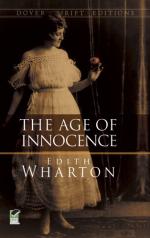Archer sat silent, with the sense of clinging to the edge of a sliding precipice. The discovery that he had been excluded from a share in these negotiations, and even from the knowledge that they were on foot, caused him a surprise hardly dulled by the acuter wonder of what he was learning. He saw in a flash that if the family had ceased to consult him it was because some deep tribal instinct warned them that he was no longer on their side; and he recalled, with a start of comprehension, a remark of May’s during their drive home from Mrs. Manson Mingott’s on the day of the Archery Meeting: “Perhaps, after all, Ellen would be happier with her husband.”
Even in the tumult of new discoveries Archer remembered his indignant exclamation, and the fact that since then his wife had never named Madame Olenska to him. Her careless allusion had no doubt been the straw held up to see which way the wind blew; the result had been reported to the family, and thereafter Archer had been tacitly omitted from their counsels. He admired the tribal discipline which made May bow to this decision. She would not have done so, he knew, had her conscience protested; but she probably shared the family view that Madame Olenska would be better off as an unhappy wife than as a separated one, and that there was no use in discussing the case with Newland, who had an awkward way of suddenly not seeming to take the most fundamental things for granted.
Archer looked up and met his visitor’s anxious gaze. “Don’t you know, Monsieur—is it possible you don’t know—that the family begin to doubt if they have the right to advise the Countess to refuse her husband’s last proposals?”
“The proposals you brought?”
“The proposals I brought.”
It was on Archer’s lips to exclaim that whatever he knew or did not know was no concern of M. Riviere’s; but something in the humble and yet courageous tenacity of M. Riviere’s gaze made him reject this conclusion, and he met the young man’s question with another. “What is your object in speaking to me of this?”
He had not to wait a moment for the answer. “To beg you, Monsieur—to beg you with all the force I’m capable of—not to let her go back.—Oh, don’t let her!” M. Riviere exclaimed.
Archer looked at him with increasing astonishment. There was no mistaking the sincerity of his distress or the strength of his determination: he had evidently resolved to let everything go by the board but the supreme need of thus putting himself on record. Archer considered.
“May I ask,” he said at length, “if this is the line you took with the Countess Olenska?”
M. Riviere reddened, but his eyes did not falter. “No, Monsieur: I accepted my mission in good faith. I really believed—for reasons I need not trouble you with—that it would be better for Madame Olenska to recover her situation, her fortune, the social consideration that her husband’s standing gives her.”




